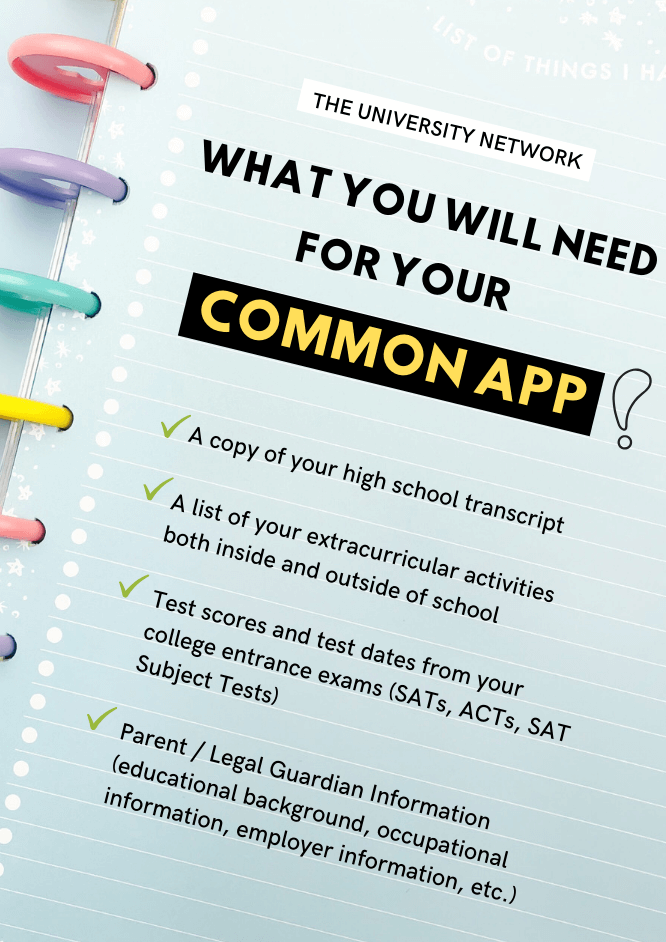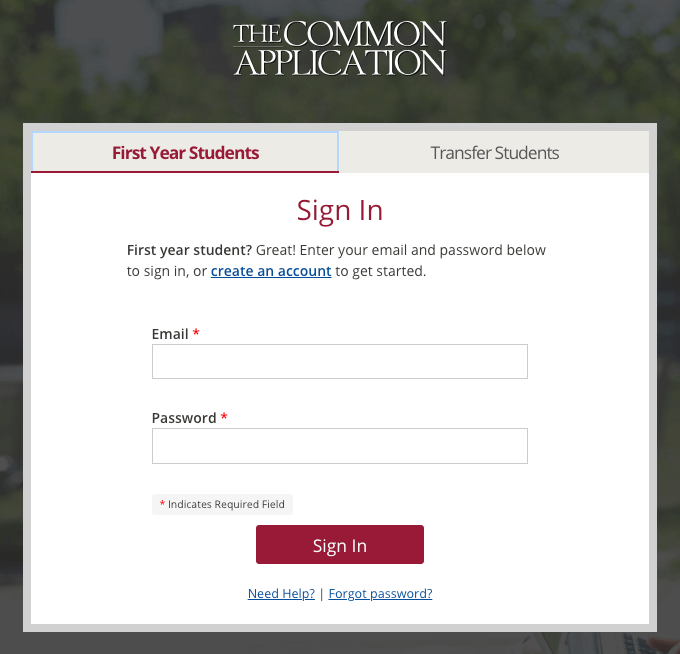There’s nothing more tedious, repetitive and especially expensive than having to fill out a separate college application with mostly the same information for every college you want to apply.
But thank goodness for the Common Application, or the Common App for short.
Established in 1975, the Common App is a one-stop shop to build a single, free college application that is accepted by nearly 900 schools spread across 20 different countries. Besides a few college-specific requirements, students can fill out their general information, such as their name, family information, education and extracurricular activities, just once for however many different colleges on their list.
Each year, more than 1 million students, one-third of whom are first-generation college students, meaning they are the first ones to attend college in their families, apply to colleges through the Common App’s free online application.
So, if you’re either a first-time or a transfer applicant, here’s a comprehensive list of everything you need to know to make the best use of the Common App.
1. When can I start using the Common App?
The new edition of the Common App opens every year on August 1st. But, you can create an account at any time, as early as you’d like.
It’s always better to start using the Common App from the day it opens. Look around and get familiar with the website.
Although you don’t necessarily have to submit everything so early, it’s always better to review in advance the general requirements and school-specific requirements, such as supplemental essays and different deadlines for early decision, early action or regular decision.
2. Can I get fee waivers for the Common App?
First, the Common App itself is free to use and about 45% of the member schools don’t charge application fees. But, that also means the other 55% require students to pay an application fee when submitting their application.
According to U.S. News and World Report, the average application fee of 953 colleges was $44 in 2019. Of the 61 schools that charged the highest application fees (including ties), the fee was at least $75. And 19 of the 61 schools charged prices exceeding $75. Stanford, for example, charged $90.
If your school requires an application fee, but you are in need of financial assistance, you can make that known through the Common App. Go to the Profile section and request a fee waiver in the Common App Fee Waiver section. Then, to affirm your request for a fee waiver, your counselor will be asked to fill in a Fee Waiver form.
To receive the Common App fee waiver, you need to be eligible to receive an ACT or SAT testing fee waiver, enrolled in or eligible to participate in the Federal Free or Reduced Priced Lunch Program (FRPL), living in a federally subsidized public housing, a foster home or are homeless, or eligible for a few other conditions. Check here to see the complete list of possible indicators of your eligibility.
Once approved, you can use the fee waiver to any schools you apply to. However, according to the National Association for College Admission Counseling (NACAC), an organization that sets the standards for the fee waiver, you are recommended to use the form to no more than four colleges. Contact your high school counselor directly for more info.
Even international students may be eligible for the fee waiver. However, note that each individual college ultimately decides whether or not it will waive your application fee.
3. What do I need for my Common App?
In order to start filling in general information on your common app, you’ll need a copy of your high school transcript, a list of extracurricular activities both inside and outside of school, test scores and test dates from your college entrance exams, and parent or legal guardian information.

4. How do I start my Common App?
First, go to commonapp.org and create an account. Fill in some basic profile info, such as your name, date of birth, address, phone number, and an email address.

Your email address will become your username on the Common App that will be seen by many college admissions offices. To keep things organized and professional, I recommend creating a separate email address solely for applying to colleges. You don’t want to use the same email address that you made back in fifth grade with your <3 emoticons or nicknames. To help admissions offices immediately recognize you by your legal name, go with something like, firstname_lastname@gmail.com or other preferred domain addresses.
Second, add schools to your list. Once you’re logged in, you can click on the college search tab to search from nearly 900 schools based on their name, location, deadline or distance from your home.
Third, fill out your Common App. Besides any college-specific requirements, make sure to fill out other general information first, such as your high school grades, extracurricular activities, test scores and test dates from any of college entrance exams, and parental information.
Lastly, review the essay prompts for the Common App and, if they have any, supplemental essay prompts for individual schools. Review any other school-specific requirements and their deadlines.
5. What are the essay prompts for the Common App?
The Common App essay prompts remain more or less the same every year. You choose one out of the seven prompts. Your essay has to be between 250 and 650 words.
Since your Common App essay will be seen by multiple colleges with different values and visions, you want your essay to be more introspective and about your personality than field-specific. For example, if you’re applying as a business major at some schools only, you don’t want your Common App essay to be all about your business side. You can leave that for your supplemental essays for individual schools.
Moreover, the Common App essay is intended to encourage students to tell something about themselves that cannot be told through their grades, test scores, list of extracurricular activities, or awards.
Depending on who you are, this can be stressful, easy, or even a humbling experience of realizing that you actually don’t even know that much about yourself. So, if it feels too hard, don’t fret. If it feels too easy, try to think again.
6. How long does it take to fill out an application?
It depends. But, generally speaking, give about six weeks in total, two weeks to fill out any general info and at least a month for other requirements, such as essays, transcripts, and recommendation letters.
If you know which teachers or counselors you want to ask for recommendation letters, be sure to give them enough time to write and submit those materials to the Common App before deadlines. The common practice is to ask them before the end of your junior year to let them prepare in advance and possibly work on your recommendations during the summer.
7. Do I have to use the Common App?
No. Although the platform is popular, the Common App is neither the only route for submitting college applications nor is it required at all colleges.
Many schools allow or even require students to apply through their own websites. Some states have application systems that students can or must use in order to apply to schools in their states. If your schools do not appear on your Common App search, you need to check the schools’ websites directly.
Some schools accept other platforms, such as the Coalition Application and the Universal College Application. And some schools accept applications from multiple platforms. For example, some of the Ivy League schools, such as Princeton, Harvard and Cornell, accept applications from all three platforms.
However, the choice really depends on the list of colleges you’re interested in. For example, if you have a very long and broad list of colleges, the Common App serves you better. Compared to nearly 900 schools accepting the Common App, only about 150 and 9 schools accept the Coalition Application and the Universal College Application, respectively.
But, if you are in need of financial assistance, you might want to also use the Coalition Application because they are only connected with schools that promise to provide substantial support, whether through financial aid or scholarships, to low income or underrepresented students, specifically.
8. What are some tips and strategies?
The college application process can be stressful. To help you start and prepare on better grounds, here are some useful tips and strategies.
- Start during the summer before senior year. The last thing you want is to cram everything the night before the deadline. Even if you have all the materials ready the night before, you are going to rush things and most likely make careless mistakes.
One of the most common reasons why schools reject applicants is because of incomplete applications, such as too many silly errors, missing test scores, recommendation letters and other application materials. This shows that applicants are unprepared, at best, or insincere about their desire to go to their school, at worst. So, double-check and make use of the Common App’s preview feature to review your application before submitting.
- Organize your documents. Especially if you are applying to many colleges, you can easily get bogged down with documents after documents. Along with making a new email for the college application process, keep all documents related to the application process in a single folder on your computer. Then, make subfolders with each school’s name and put all school-specific documents in there. Title all files with the content and the school’s name to avoid submitting a wrong document. For example, title your supplemental essay for New York University as supessay_NYU.
- Make use of free resources online. The Common App offers free video tutorials online under its Virtual Counselors tab for any students feeling stuck or stressed about the whole application process. They cover a wide range of topics, from general tips for filling out the Common App to tips for first-generation college students.
Also, Naviance is a college and career readiness software provider that is integrated with the Common App and helps both counselors and students to keep track of documents, such as transcripts and recommendation letters. Naviance offers free resources, such as SuperMatch that matches students with a list of colleges based on their grades, location, or interested majors. For more info, ask your counselors directly.
- Download the Common App on your phone. The Common App’s mobile app helps students to easily keep track of deadlines, invite recommenders and set reminders for themselves.
Conclusion
Although the college admission process can still be, if not increasingly more, competitive, you’re not without help. With the help from the Common App, the college application process has become easier, quicker and for some students, cheaper. Be sure to take full advantage of the Common App to help ease the process!



